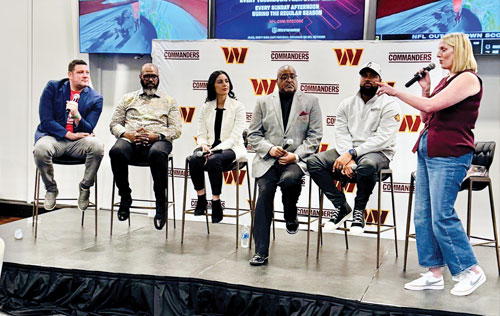On Dec. 1 at Northwest Field, the NFL’s Washington Commanders faced off against the Tennessee Titans. Prior to kickoff, a discussion panel gathered to tackle an obstacle even greater than a last-second Hail Mary: mental health stigma. The APA Foundation and the Commanders partnered to present the team’s inaugural Raise Awareness for Mental Health event.
Moderated by Kelly Mahoney of the American Foundation for Suicide Prevention, the panel included Marcus Smith, NFL veteran and mental health advocate; Eric Kussin, creator of We’re All a Little “Crazy”; Brook Choulet, M.D., APA member and concierge sports psychiatrist; Darron Garner, Ph.D., clinical social worker; and Rawle Andrews Jr., Esq., executive director of the APA Foundation. The panel discussion covered the importance of overcoming mental health stigma, how to support young athletes’ mental health, addressing mental health while remaining competitive, and more.
“I wish that in 2014, when I first got drafted, I’d had a mental health support team around me, because it would’ve made the game easier,” Smith said. “I thought mental toughness meant suppression and not talking about the things that were bothering me. When I got to therapy, I was given a feelings wheel, and at first, I couldn’t even articulate my feelings. Being in those moments helped me understand that mental toughness means speaking up and that speaking up isn’t a weakness, it’s a strength. That’s when I took the leap of faith to become a mental health advocate.”
Awareness, literacy, and action are the three legs of the mental health stool, Andrews said. Admitting that you’re struggling or expressing to a loved one that you’re worried about their mental health takes courage, but that action is the first step toward accessing care. The APA Foundation’s public awareness campaign,
Mental Health Care Works, aims to educate the public about common mental health concerns and raise awareness of treatment options and resources.
Choulet emphasized the importance of mental health education for athletes, whether it comes from a campaign, a coach, or a clinician like herself. “During my first two weeks working with the Phoenix Suns, players were scared to even be seen talking to me,” she said.
What many people, including athletes, may not realize is that you don’t need to be in crisis—or even have a diagnosable mental health condition—to benefit from speaking with a mental health professional. “After the players learned that I was there to provide preventive tools, we broke the ice,” Choulet said. “My key word is integration; the team sports psychiatrist needs to be integrated into the team just like everyone else on the performance staff.”
The panel included a live Q&A session and was followed by a victory for the Commanders when they beat the Titans 42-19. The APA Foundation’s Where We Play programming supports mental health literacy and awareness for athletes and performers at all stages of their career—youth to professional. To learn more about Where We Play and how it fits into the APA Foundation’s vision of a mentally healthy nation, visit
apaf.org/play. ■

